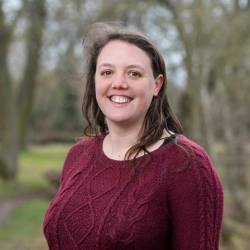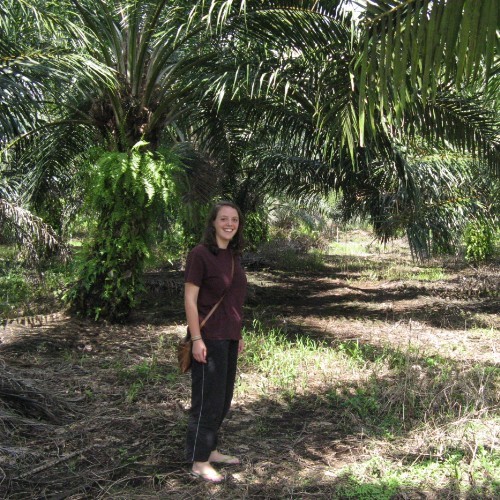University of Oxford
11a Mansfield Rd
OX1 3SZ
UK

Frances Manning
Background
I studied Biological Sciences with honours in Ecology at the University of Edinburgh and an MRes in Ecology and Environmental Management from the University of York. I then went to the University of Aberdeen for my PhD, where I looked at the carbon dynamics in oil palm plantations growing on peat soil. As part of my PhD, I spent two years living in Borneo on two palm oil plantations. Back in the UK, I had the opportunity to assist the IPCC Special Report on Climate Change and Land as a Chapter Scientist. I then worked for RSK ADAS as a Sustainable Agriculture Consultant, where I specialised in projects looking at carbon, nitrogen and water flows.
Research Interests

I am interested in sustainable food systems and global food security. According to the FAO, global hunger was 9.2% in 2022. I am concerned that climate change is already impacting our food systems as temperatures rise, rainfall patterns change, and extreme weather events become more likely. At the same time, the human population is growing and we have a biodiversity crisis. I aspire to learn more about how food is grown and what barriers face our farmers, so that I can support our farmers with these challenges.
Current Research
I am currently working on the HESTIA project. HESTIA, the Harmonised Environmental Storage and Tracking of the Impacts of Agriculture platform, is a project between the Oxford Martin School and Department of Biology. HESTIA provides an open-access platform that stores standardised data on agricultural production, allowing for direct comparison between food products. It also provides harmonized and transparent models to calculate multiple environmental impact indicators and enable benchmarking against similar farms.
My contribution to HESTIA includes building a model to help quantify the environmental impacts of land use change for agriculture and contributing data to the platform.
Brief CV
2020 – 2024 Sustainable Agriculture Consultant, RSK ADAS
2018 – 2019 Chapter Scientist, IPCC Special Report on Climate Change and Land
2013 – 2019 PhD Candidate in Biological Sciences, University of Aberdeen
2012 – 2013 MRes in Ecology and Environmental Management, University of York
2008 – 2012 BSc in Biological Sciences with honours in Ecology, University of Edinburgh
Publications
Manning FC, Kho KL, Hill TH and Teh YA (2024) Spatial variations in heterotrophic respiration from oil palm plantations on tropical peat soils. Journal: Frontiers in Forests and Global Change.
Manning FC, Kho KL, Hill TH, Cornulier T and Teh YA (2019) Carbon emissions from oil palm plantations on peat soil. Frontiers in Forests and Global Change, 2, 37. doi: 10.3389/ffgc.2019.00037
Smith P, Calvin K, Nkem J, Campbell D, Cherubini F, Grassi G, Korotkov V, Le Hoang A, Lwasa S, McElwee P, Nkonya E, Saigusa N, Soussana J-F, Taboada MA, Manning FC, Nampanzira D, Arias-Navarro C, Vizzarri M, House J, Roe S, Cowie A, Rounsevell M and Arneth A (2019) Which practices co-deliver food security, climate change mitigation and adaptation, and combat land-degradation and desertification? Global Change Biology. doi: 10.1111/gcb.14878
McElwee P, Calvin K, Campbell D, Cherubini F, Grassi G, Korotkov V, Le Hoang A, Lwasa S, Nkem J, Nkonya E, Saigusa N, Soussana J-F, Taboada MA, Manning FC, Nampanzira D and Smith P (submitted). The impact of interventions in the global land and agri-food sectors on Nature’s Contributions to People and the UN Sustainable Development Goals. Global Change Biology.
